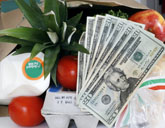
If it seems like you bring home fewer bags of food for your money every time you go to the grocery store, it will come as no surprise that food is our third-highest expenditure. Although we can’t stop buying food or make prices go down, we can shop wisely and manage the food we have on hand to get the best value for our food dollars.
The first thing we can do is make sure we eat all the food we purchase. That may sound obvious, but according to a recent University of Arizona study, households typically throw away about $1,000 worth of food in a year.
To make sure you won’t be throwing food away, plan to make leftovers. That can mean having a potluck night to clean out the refrigerator or packaging leftovers from dinner for the next day’s lunch. Keep a plastic container in the freezer to hold leftover vegetables. When it gets full, you are very close to having vegetable soup. Buy only what you can eat of fresh fruits and vegetables. You can supplement those fresh fruits and vegetables with canned and frozen.
Fresh fruit and vegetables represent some of our largest food waste. Save money by purchasing items that are in season. You can save a significant amount of money by planting a garden. And the closer you can get to fresh-picked, the more nutrients your produce will have — the produce you bring in from your backyard will be packed with nutrients.
Only go to the store once a week. If you plan meals around store ads, make a list and shop wisely to help save money. The longer you linger at the store, the more likely you are to make impulse purchases that bust your budget — so being organized and sticking to your list helps you save money.